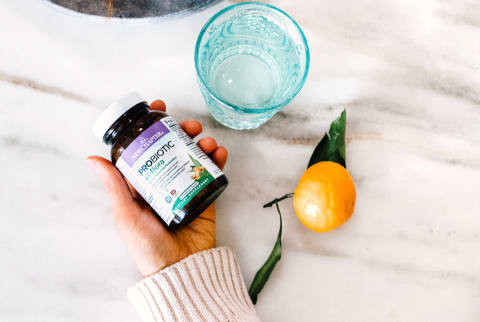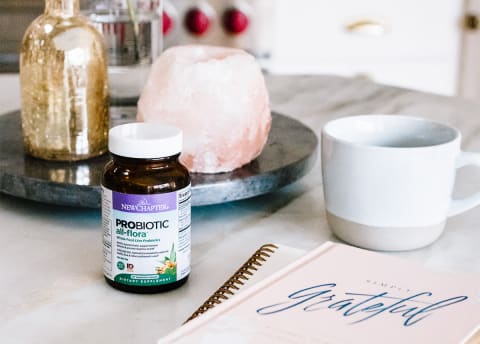Advertisement
Prebiotics, Postbiotics, Probiotics … What's The Difference & Do I Need All 3?

If you've read this headline and immediately rolled your eyes, we get it. Another day, another microbiome discovery—will it ever end? The reality is, as science dives deeper into this strange and wonderful bacterial world within the human body, we're finding that the role it plays in our mental, physical, and overall health is pretty hard to ignore at this point. So, onward we go.
So, what's the big deal?
Before we get to the explainer on postbiotics, it helps to understand its context. Let's backpedal for a minute: Each of us has trillions of bacterial cells living in and on our bodies at any given time, an ecosystem that's collectively referred to as our microbiome. It's previously been thought that these microbial cells outnumber our own human cells by 10 to 1 (some estimates have even pinned the ratio at a wild 100 to 1!), but the latest studies say the count is actually closer to 1:1.

Your microbiome, which is mainly located in the gut, is as unique as your fingerprint, and it's comprised of good and bad bacteria. Depending on a number of factors—some of which we can control like how we eat and our hygiene, and some that are out of our control like our age and environment—the population of good and bad bacteria in our gut is in constant flux. This can affect everything from your digestion to your immune response and even your mood, which is why maintaining a balanced microbiome becomes important—and it's an all-hands-on-deck situation.
Probiotics, prebiotics, postbiotics: Do I really need all three?
Probiotics are the beneficial bacteria that help keep us healthy and defend our bodies from certain disease-causing bacteria. Thanks to extensive ongoing research, we've found that probiotics provide a wide range of health benefits that directly support immune system defenses, digestive system function, and detoxification. We get them through probiotic-rich foods like yogurt, miso, kimchi, kombucha, and tempeh.
Probiotic supplements are also an increasingly popular way to boost your intake for gut health. New Chapter's Probiotic All-Flora blend, for example, contains 10 billion colony-forming units of clinically studied friendly bacteria strains formulated in amounts that are shown to work. There are lots of probiotic supplements on the shelf these days—the cool thing about Probiotic All-Flora's daily capsules is that they deliver not just probiotics but also prebiotics and postbiotics for comprehensive benefits when it comes to digestive wellness. This three-in-one blend supports gastrointestinal stress, including bowel regularity, and helps reduce occasional gas, bloating, diarrhea, and constipation. (FYI: The Food and Drug Administration hasn't approved any probiotic supplements for treating or preventing any health problem.)
Confused about why you'd need more than just probiotics? Keep reading.

Prebiotics, simply put, are food for probiotics. They're essentially plant fiber from foods like apples, asparagus, bananas, dandelion greens, garlic, and even nuts that can't be digested. They eventually make their way to your gut to stimulate the growth of beneficial bacteria there. So eating whole-plant, prebiotic-rich foods—or ensuring your probiotic supplement contains prebiotic nourishment—is one of the best things you can do for your microbiome to keep all the beneficial bacteria happy.
Postbiotics are the relatively newer1 microbiome kid on the block. As the name suggests, they are the metabolic by-products created by beneficial bacteria through a fermentation process in the gut when prebiotics feed probiotics. In basic terms, when probiotics digest prebiotics, postbiotics are produced. Scientists are recognizing that they have health-boosting benefits of their own, too.
Early studies are suggesting2 that postbiotics may have anti-inflammatory and antioxidant properties that help protect, restore, and support our gut health and some of our bodies' physiological processes: Their benefits may include helping our bodies fight infections, control weight gain and blood sugar, and maintain healthy blood pressure and cholesterol.
While more research is still needed to fully understand how postbiotics influence these things, we do know that we can maximize their production by eating fermented foods or supplementing with a probiotic formula that has postbiotic nourishment covered, like New Chapter's Probiotic All-Flora.
The bottom line? Gut health is an area of ongoing study, and we're continuing to learn more about how our overall health is connected to the activity in our gut every day. The good news is that restoring our microbiome balance isn't completely out of our hands. And a one-two-three punch of prebiotics, probiotics, and postbiotics is a great place to start.
